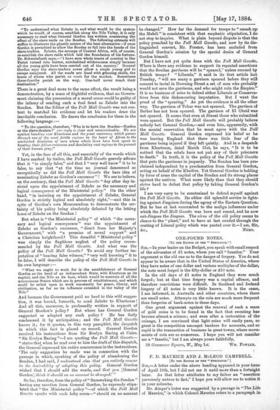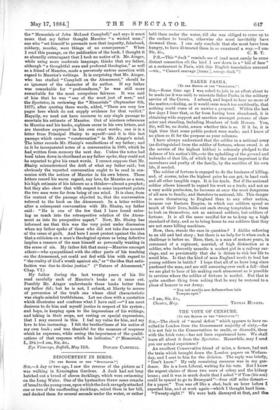F. D. MAURICE AND J. McLEOD CAMPBELL. [To THE EDITOR
OF THE " SPICTATOR."]
Sin,—A letter under the above heading appeared in your issue of April 19th, but I did not see it until more than a fortnight later. As that letter attributes to my father an " assertion perversely untrue to fact," I hope you will allow me to notice it in your columhs.
Mr. Ainger's letter was suggested by a passage in "The Life. of Maurice," in which Colonel Maurice refers to a paragraph in the "Memorials of John McLeod Campbell," and says it must mean that my father thought Maurice "a wicked man ;" one who "set himself to persuade men that impurity, falsehood, robbery, murder, were things of no consequence." When I read this passage, on the publication of the book, I thought it so absurdly extravagant that I took no notice of it. Mr. Ainger, while using more moderate language, thinks that my father, although "a thoughtful man and profound theologian," as well as a friend of Maurice, made a perversely untrue assertion with regard to Manrice's writings. It is surprising that Mr. Ainger, who has studied "Campbell on the Atonement" should be so ignorant of the character of its author. If my father was remarkable for "profoundness," he was still more remarkable for the most scrupulous fairness. It was said -of him that he was "one of the most just of men," and the Spectator, in reviewing the " Memorials " (September 8th, 1877), after quoting these words, added, "There are very few pages here which do not supply evidence for that verdict." Happily, we need not have recourse to any single passage to ascertain his estimate of Maurice. Out of nineteen references to Maurice and his books, eighteen occur in his own letters, and are therefore expressed in his own exact words ; one is in a letter from Principal Shairp to myself—and it is this last passage which causes " consternation " in Mr. Ainger's mind. The letter records Mr. Shairp's recollections of my father; and -in it he incorporated notes of a conversation in 1860, which he had written from memory the next day. Unless the notes had been taken down in shorthand as my father spoke, they could not to expected to give his exact words. I cannot suppose that Mr. Shairp misunderstood the drift of what my father said ; but -obviously the reported conversation ought to be read in con- alexion with the notices of Maurice in his own letters. Those letters record his warm regard, nay love, for Maurice as a man, his high estimate of his labours as a thinker—almost a prophet; but they also show that with respect to some important points the two men were far from being of one mind. It is clear, from the context of the passage objected to, that the conversation referred to the book on the Atonement. In a letter written after a subsequent conversation with Mr. Shairp, my father -said: "He is one of the few that I have found enter- ing as much into the retrospective relation of the Atone- ment as into its prospective aspect." Now, Mr. Shairp has informed me that this was the very point under discussion when my father spoke of those who did not take due account -of the sense of guilt. And here I must protest against the idea that a criticism on a man's theological system as being defective implies a censure of the man himself as personally wanting in the sense of sin. My father felt that many—Maurice amongst others—who sympathised with the other parts of his teaching -on the Atonement, yet could not feel with him with regard to 4‘ the reality of God's wrath against sin," or "the idea that satis- faction was due to divine justice." ("Nature of Atonement," Chap. -VI.)
My father during the last twenty years of his life read carefully each of Maurice's books as it came out Possibly Mr. Ainger understands those books better than any father did ; but he is not, I submit, at liberty to accuse -of perversion of the truth one whose chief characteristic was single-minded truthfulness. Let me close with a quotation which illustrates and confirms what I have said :—" I am most desirous to do him and myself justice in respect of his system ; .and hope, in keeping open to the impressions of his writings, and taking in their scope, not resting on special expressions, that I may succeed in this. I feel my value for him, and my love to him increasing. I felt the brotherliness of his notice of my own book ; and was thankful for the measure of response which he expresses, while seeing the importance of the qualifi- cations of that response which he indicates." (" Memorials," 294.)—I am, Sir, &c.,
Eye Vicarage, Suffolk, May 12th. DONALD CAMPBELL.



































 Previous page
Previous page